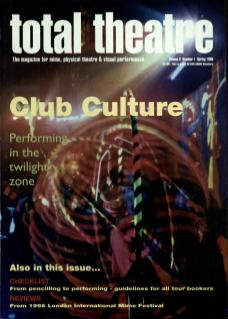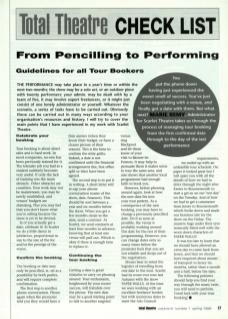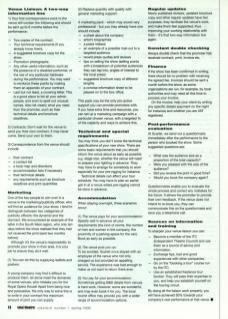The performance may take place in a year's time or within the next two months; the show may be a solo act, or an outdoor piece with twenty performers; your admin may be dealt with by a team of five, it may involve expert freelancers, or it might just consist of one lonely administrator or yourself. Whatever the scenario, a series of tasks have to be carried out. Obviously these can be carried out in many ways according to your organisation's resources and history. I will try to cover the main points that I have experienced in my work with Scarlet Theatre.
Celebrate your booking
Tour booking is about direct sales and is hard work. In most companies, no one has been previously trained for it. The telesales job you had as a student suddenly becomes very useful. If only the lack of training was the main obstacle. Other obstacles are countless. Your work may not be mainstream, you may be newly established, and venues' budgets are shrinking. Plus you may feel that you don't know what you're selling because the show is yet to be devised.
So if you actually get a date, celebrate it! At Scarlet we do a little dance in jubilation, proportional in size to the size of the fee and/or the prestige of the venue.
Confirm the booking
The booking or date may only be pencilled, i.e. set as a possibility by both parties, and will require complete confirmation.
The first step is another phone conversation. Phone again when the promoter told you they would have a firm answer (when they know their budget, or have a clearer picture of their season). This is the time to confirm the nitty gritty. Indeed, a date is not confirmed until the financial arrangements (fee, box office split or hire) have been agreed.
The second step is to put it in writing. A short letter will re-cap your phone conversation (name of the show, date, finances). This should be sent between a year and six months before the show. When you get a few months closer to the date, send a contract. At Scarlet, we send contracts at least four months in advance, knowing that at least one venue will pull out. Which is okay if there is enough time to replace it.
Continuing the tour booking
Getting a date is good stimulus to carry on phoning around. Your enthusiasm, heightened by your recent success, will translate over the phone. The new date may be a good starting point to talk to another targeted venue: ring Blackpool and let them know of your visit to Barrow-In-Furness. It may help to persuade them it makes sense to tour the same area, and also shows that another local programmer had enough faith to book you.
However, before phoning around again, look at how the new date fits into your tour pattern. As a consequence of the new booking, you may have to change a previously pencilled date. Do it as soon as possible, the venue is probably working around this date for the rest of their programming. However, you can change dates only so many times before the promoter feels that you are not reliable and drops out of the negotiation.
Always bear in mind the logistics of travelling from one date to the next. Scarlet had its worst ever tour last Autumn with the show Paper Walls. At the time we were working with an excellent freelance booker, but with numerous dates to meet the Arts Council requirements, we ended up with an unfeasible tour schedule. On paper it looked great but I will spare you with all the details of how we had to drive through the night after Exeter to Bournemouth to start a get-in on our 'rest day' on the Tuesday. And of how we had to get a catamaran from Jersey to Bournemouth which broke down and made our heroines late for the show on the Friday. The massive bags under their eyes ironically fitted well with the worn down characters of Paper Walls!
It was too late to learn that we should have allowed an extra day to come back from Jersey, and that we should have enquired about means of transport to Jersey six months, rather than a month and a half, before the date.
The following pointers should help you find your way through the many tasks you will need to perform. Good luck with your tour booking!
Venue Liaison: A two-way information line
1) Your first correspondence pack to the venue will contain the following and should be sent up to six months before the performance:
- Two copies of the contract.
- Your technical requirements (if you already know them).
- A suggested brochure copy for the show.
- Promotion photographs.
- Any other useful information, such as the presence of a disabled performer, or the use of any particular hardware during the performance. You may want to reinforce these points by making them an appendix of your contract. Last but not least, a covering letter. This is a good place to list all your admin people, and even to spell out unusual names. Also list clearly what you need from the promoter, such as their technical details and brochure deadlines.
2) Contracts: Don't wait for the venue to send you their own contract, it may never come. Send your own to them.
3) Correspondence from the venue should include:
- their contract
- a contact list
- a local map and directions
- accommodation lists if necessary
- their technical details
- any requirements such as brochure deadlines and print quantities
Marketing
One of the key people to win over in a venue is the marketing/publicity officer, who will find an audience for your show. I tend to distinguish between two categories of publicity officers: the dynamic and the dormant. We encountered an example of the latter in the South West region, who only ten days before the show realised that they had not received the print (sent two months before).
Although it's the venue's responsibility to promote your show in their area, it is your job to ensure they do it well.
(1) You can do this by supplying leaflets and posters:
A young company may find it difficult to produce them, let alone meet the demands of some venues, who mistake you for the Royal Opera House! Apart from being nice and persuasive, the only way to solve this is to write in your contract the maximum amount of print you can supply.
(2) Replace quantity with quality with general marketing support:
A marketing pack – which may sound very professional, but you may already have one – should include:
- a sheet about the company
- artist biographies
- a press release
- an example of a possible mail-out to a targeted audience
- recent press quotes and reviews
- tips on selling the show (selling points with a breakdown of potential audiences they can tap into, angles of interest to the local press)
- suggested brochure copy of different lengths
- a concise information sheet to be passed on to the box office.
This pack may be the only proactive support you can provide promoters with. If you have extra time and resources, you can set up a marketing campaign with a particular chosen venue, with a targeted % of the capacity and ways to achieve this.
Technical and special requirements
You may think you don't know the technical specifications of your new show. There are some basic requirements that you should inform the venue about as early as possible – e.g. stage size, whether the venue will need to prepare your lighting in advance. They may have to arrange for somebody to work especially for your pre-rigging for instance.
Technical details can affect your tour schedule. You may have to plan an earlier get-in at a venue where pre-rigging cannot be done in advance.
Accommodation
When staying overnight, three scenarios occur:
(1) The venue pays for your accommodation: Specify well in advance all your requirements (the kind of rooms, the number of men and women in the company, the proximity of a parking space for the van). Book as early as possible.
(2) The venue puts you up: To be avoided. Scarlet once stayed with an employee of the venue who not only charged us but provided an appalling service. The experience was bad enough to make us not want to return there ever.
(3) You pay for your accommodation: Sometimes getting B&B details from venues is hard work. However, some are wonderful, and may even book it for you. The local tourist office may provide you with a wider range of accommodation options.
Regular updates
Newly published reviews, updated brochure copy, and other regular updates have two purposes, they facilitate the venue's work, and make them feel supported, thus improving your working relationship with them – it's that two-way information line again.
Constant double checking
Always double check that the promoter has received contract, print, invoice etc.
Finance
If the show has been confirmed in writing, there should be no problem with receiving the agreed fee. Invoices should be sent a month before the show, as some organisations are run, for example, by local authorities and may need all this time to process your invoice.
On the invoice, help your client by writing any specific details (payment on the night for instance) and whether you are VAT registered.
Post-performance evaluation
At Scarlet, we send out a questionnaire immediately after the performance to the person who booked the show. Some suggested questions are:
- What was the audience size as a proportion of the total capacity?
- Were you pleased with the size of the audience?
- Did you receive the print in good time?
- Would you book the company again?
Questionnaires enable you to evaluate the whole process and correct any mistakes for the future. It allows the promoter to provide their own feedback. If the venue does not intend to rebook you, they can communicate this on the questionnaire and save you a telephone call.
Sources on information and training
To sharpen your venue liaison you can:
- Become a member of the ITC (Independent Theatre Council) and use them as a source of advice and information.
- Exchange tips, bad and good experiences with other companies
- Go on the ‘booking a tour’ course run by the ITC.
- Use an established freelance tour booker. They will pass their expertise to you, and help you establish yourself on the touring circuit.
By doing all the liaison work properly, you will have achieved 50% towards your company’s next performance at that venue.


